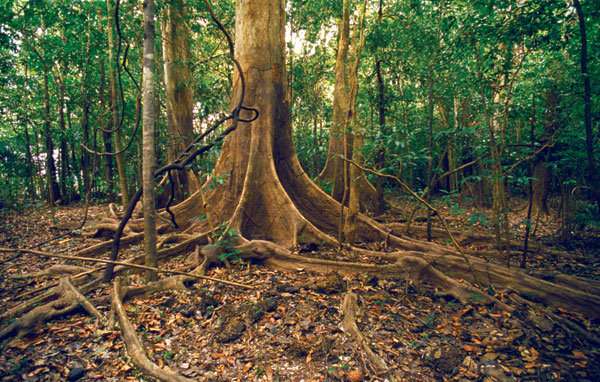Survey reveals that Brazilians wish to be closer to nature

A survey conducted by IBOPE Inteligencia and commissioned by WWF-Brazil, on what Brazilians think about Protected Areas and the environment, reveals a population who values the environment, wants to be closer to nature, and thinks that taking care of the environment is also the citizens' responsibility.
Data collection took place on June 21-26, 2018, among individuals aged 16 or older from different social classes and national representativeness. This was the second round of the same survey that was commissioned by WWF-Brazil in October 2014.
In 2018, deforestation and freshwater pollution continue to be seen as the main threats to the environment, mentioned by 27 and 26 per cent of the interviewees, respectively – basically the same percentage as in 2014.
The survey is being launched in the month featuring the Amazon Day, on September 5, and the Cerrado Day, on September 11 – two biomes that are threatened by deforestation. Taking into consideration the 2017 monitoring data from the Amazon Deforestation Estimation Project (PRODES), publicized by the National Space Research Institute (INPE), 6,947 square kilometers/year – an area equivalent to the city of Rio de Janeiro—is deforested in the Amazon every two months. In the Cerrado, an area of 7,408 square kilometers/year – equivalent to two soccer fields – is deforested every minute.
Illegal hunting and fishing, together with climate change, rank third among the concerns of the interviewees (16 per cent). Infrastructure works, such as hydropower plants, highways, and ports were mentioned by 15 per cent.
According to the survey, nine out of ten Brazilians believe that nature is not being adequately protected. In 2014, the percentage in this issue was 82 per cent. This perception went up to 91 per cent of the interviewees in 2018.
Nevertheless, the survey observes that there is a significant increase in the percentage of interviewees who impute the responsibility of taking care of Protected Areas (parks, reserves, national forests) to the citizens. In 2018, the number of Brazilians who believe that taking care of such areas is also a duty of the citizens went up by 20 points in comparison with 2014, going from 46 to 66 per cent.
Government, however, continues to be the main agent in charge of this task, according to 72 per cent of citations. NGOs appear in third, as 23 per cent of Brazilians believe that civil organizations should act to defend the environmental cause.
"The great majority expects a higher commitment from public powers in the protection of nature and for a better quality of living. And one solution depends on the other: they are intrinsically connected, as for instance, when we search for better quality of air and less water pollution", says Mauricio Voivodic, WWF-Brazil's CEO. "The survey also indicates that people believe that they should participate more in the care of nature, that they are worried by deforestation, and the support of the population to defend Protected Areas may increase", adds Voivodic.
National pride
When Brazilians are questioned about their reasons to be proud of their country, a decrease was observed in the valuation of most of the surveyed features. In 2014, the answer to the same question revealed that 58 per cent of the interviewees were proud of the environment and its wealth. In 2018, this number went down to 39 per cent.
Nonetheless, the 2018 survey results point out that, in spite of the decrease in the valuation of the features related to the reasons for pride of the country, in comparison with 2014, the environment and the Brazilian natural wealth continue to occupy a prominent position among the interviewees, and were mentioned by 39 per cent.
Subsequently, the interviewees mentioned the quality of living (30 percent), the population/cultural diversity (26 percent), and sports (23 percent) as the main reasons for national pride. A possible cause for the general decrease in the valuation of features, in comparison with 2014, may be the negative moment experienced by the country in 2018.
Ecological services
When the interviewees were shown a list of possible benefits (ecological services) generated by the Protected Areas for society, they pointed out the air quality improvement (51 percent), the springs and rivers protection (45 percent), and the animal and plant diversity protection (44 percent) as the main advantages.
Recreation (31 percent), income generation for local population (26 percent), and timber supply (8 percent) are also highly regarded. Practically in all items, the percentage was lower than the one obtained in 2014 for the same question.
Although the valuation of nature in the Brazilians' daily life that was observed in 2014 still remains, the challenge of greater awareness and mobilization of the population regarding environmental themes is even greater in 2018.
The correlation between the benefits provided by Protected Areas regarding the "protection of plant and animal diversity" and the "protection of springs and rivers" are themes that are still distant from the perception of the general public; besides the low degree of connection between the Protected Areas and such topics, those features show a decrease in comparison to 2014.
The valuation of places with natural landscape, when traveling, went up 20 points for the total sample in the 2018 survey, in comparison to the previous survey. In the present edition, over half the population remains unsatisfied with the green areas existing in their cities, although they usually carry out activities in nature (52 percent).
Provided by WWF



















